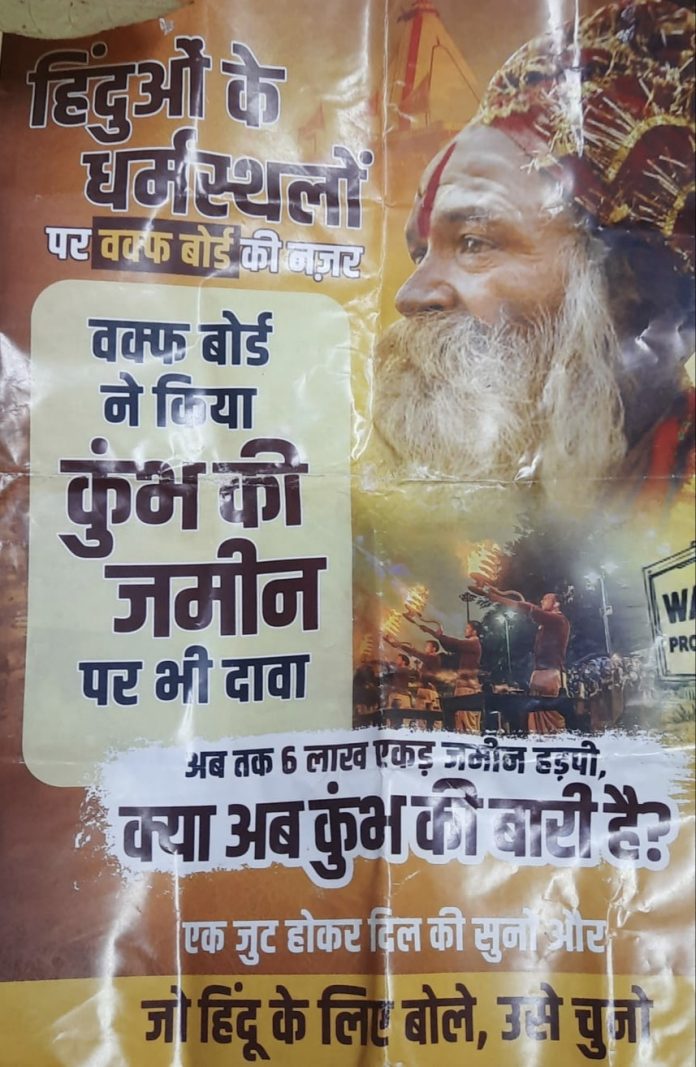Waqf Board Controversy: Political Polarization Ahead of Delhi Elections
As Delhi gears up for its assembly elections on February 5, right-wing groups are intensifying their efforts to manipulate public sentiment and polarize voters in favor of the BJP. A new narrative, centered around the Waqf Board, has emerged as a powerful tool in their divisive campaign. This coincides with the controversial Waqf Amendment Bill 2024, which is being perceived as an attempt to deepen societal divides along communal lines for political advantage.
One of the most concerning aspects of this strategy is the circulation of a pamphlet in Hindu-dominated localities, making unsubstantiated claims about the Waqf Board’s actions. The pamphlet falsely asserts that the Waqf Board has “claimed the land of Kumbh” and accuses it of “grabbing 5.6 million acres of land so far.” It ends with a provocative and inflammatory slogan: “Ab Tak 6 lakh acres properties hadap liye, Kiya Ab Kumbh ki baari Hai, Jo Hindu ke liye bole, use chuno”. This slogan aims to stoke fear and division, urging Hindus to unite under a leader who will “speak for Hindus.”
The language used in the pamphlet is specifically designed to incite anger and hatred, creating a narrative that the Waqf Board is targeting Hindu religious sites and cultural symbols. However, these claims have no factual basis. They are part of a deliberate political strategy to deepen communal rifts and exploit fears for electoral gains.
In addition to the slogan, the pamphlet makes nine false allegations against the Waqf Board. It claims, for example, that the Waqf Board has staked a claim to over 200 historical and religious sites in Delhi, including iconic landmarks. The pamphlet also makes unverified claims about land grabs in other states like Karnataka and Maharashtra. However, what stands out most about the pamphlet is its anonymity. There is no name of any individual or organization behind it, making it all the more questionable. Its anonymous nature is a violation of election rules, which requires transparency and accountability in campaigning materials.
Such pamphlets are part of a broader strategy to polarize voters by spreading baseless communal fears. The right-wing groups aim to create an environment of distrust and animosity between communities, hoping that this fear will translate into votes for their political agenda. The Waqf Board, in reality, is a legal entity that manages properties donated for religious and charitable purposes, primarily benefiting the Muslim community. The claims made in this pamphlet about the Waqf Board’s supposed threat to Hindu sites are simply not true.
Unfortunately, this tactic of inflating communal issues and spreading misinformation is not unique to the Waqf Board controversy. Across India, similar attempts are being made to use divisive rhetoric to manipulate public opinion. It is crucial for voters to critically assess such pamphlets and not allow themselves to be misled by false narratives.
In this volatile political climate, it is more important than ever to resist divisive propaganda. The spread of misinformation only serves to damage the social fabric of India, which has always been characterized by its pluralism and unity. Voters must choose leaders who promote peace, coexistence, and the values of a truly democratic society.




